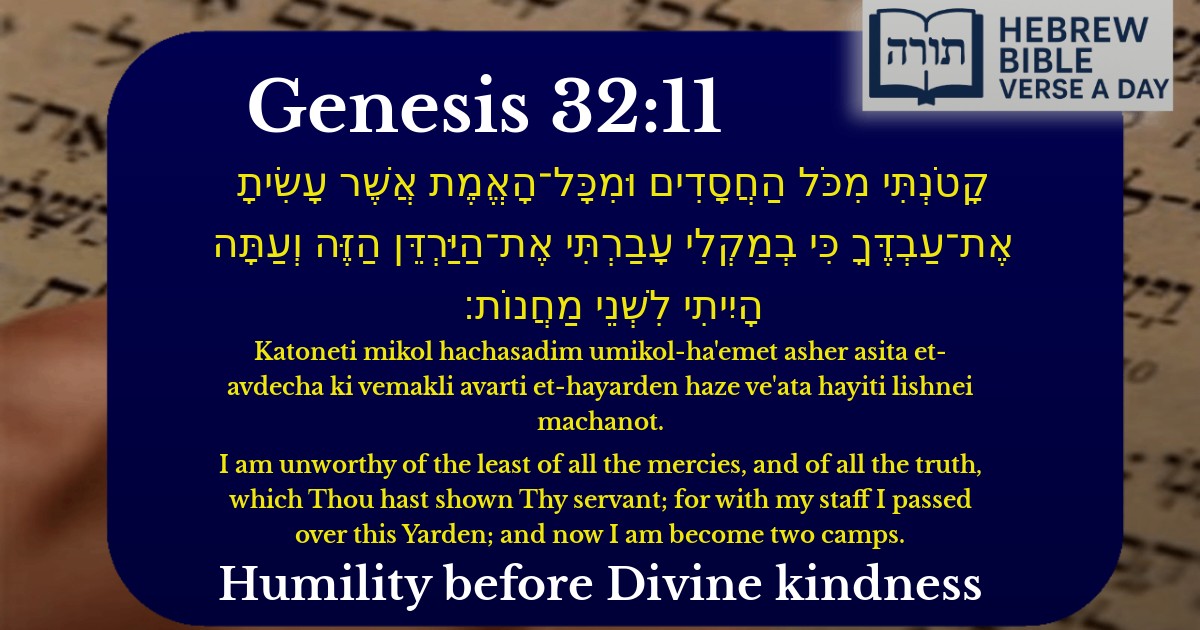Join Our Newsletter To Be Informed When New Videos Are Posted
Join the thousands of fellow Studends who rely on our videos to learn how to read the bible in Hebrew for free!
Hebrew Text
קָטֹנְתִּי מִכֹּל הַחֲסָדִים וּמִכָּל־הָאֱמֶת אֲשֶׁר עָשִׂיתָ אֶת־עַבְדֶּךָ כִּי בְמַקְלִי עָבַרְתִּי אֶת־הַיַּרְדֵּן הַזֶּה וְעַתָּה הָיִיתִי לִשְׁנֵי מַחֲנוֹת׃
English Translation
I am unworthy of the least of all the mercies, and of all the truth, which Thou hast shown Thy servant; for with my staff I passed over this Yarden; and now I am become two camps.
Transliteration
Katoneti mikol hachasadim umikol-ha'emet asher asita et-avdecha ki vemakli avarti et-hayarden haze ve'ata hayiti lishnei machanot.
Hebrew Leining Text
קָטֹ֜נְתִּי מִכֹּ֤ל הַחֲסָדִים֙ וּמִכׇּל־הָ֣אֱמֶ֔ת אֲשֶׁ֥ר עָשִׂ֖יתָ אֶת־עַבְדֶּ֑ךָ כִּ֣י בְמַקְלִ֗י עָבַ֙רְתִּי֙ אֶת־הַיַּרְדֵּ֣ן הַזֶּ֔ה וְעַתָּ֥ה הָיִ֖יתִי לִשְׁנֵ֥י מַחֲנֽוֹת׃
קָטֹ֜נְתִּי מִכֹּ֤ל הַחֲסָדִים֙ וּמִכׇּל־הָ֣אֱמֶ֔ת אֲשֶׁ֥ר עָשִׂ֖יתָ אֶת־עַבְדֶּ֑ךָ כִּ֣י בְמַקְלִ֗י עָבַ֙רְתִּי֙ אֶת־הַיַּרְדֵּ֣ן הַזֶּ֔ה וְעַתָּ֥ה הָיִ֖יתִי לִשְׁנֵ֥י מַחֲנֽוֹת׃
🎵 Listen to leining
Parasha Commentary
📚 Talmud Citations
This verse is quoted in the Talmud.
📖 Chullin 91a
The verse is referenced in a discussion about Jacob's humility and his acknowledgment of God's kindness, illustrating his modest self-assessment despite his significant blessings.


Context of the Verse
This verse (Bereshit 32:11) is part of Yaakov Avinu's prayer to Hashem before his encounter with Esav. Yaakov expresses humility and gratitude for the blessings he has received, acknowledging his unworthiness of Hashem's kindness.
Yaakov's Humility
Rashi explains that Yaakov's statement "קָטֹנְתִּי" ("I am unworthy") reflects his deep humility. Despite being chosen by Hashem and receiving numerous blessings, Yaakov does not take them for granted. The Midrash (Bereshit Rabbah 76:2) elaborates that Yaakov felt his merits had diminished due to the wealth and success he had acquired, making him unworthy of further kindness.
The Meaning of "חֲסָדִים" and "אֱמֶת"
"With My Staff I Crossed This Jordan"
Yaakov contrasts his past and present: when he fled from Esav, he had nothing but a staff (Bereshit 32:10), yet now he returns with great wealth and family. The Kli Yakar notes that this emphasizes Hashem's providence—Yaakov's success was not due to his own efforts but to divine blessing.
"Now I Have Become Two Camps"
Rashi explains that Yaakov divided his family and possessions into two groups (מַחֲנוֹת) as a strategic measure against Esav's potential attack. The Ohr HaChaim adds that this also reflects Yaakov's spiritual insight—he prepared both physically and through prayer, demonstrating his trust in Hashem's protection.
Spiritual Lesson
The verse teaches the importance of humility and recognizing that all blessings come from Hashem. As the Rambam writes (Hilchot De'ot 2:3), true greatness lies in acknowledging one's limitations and attributing success to divine favor rather than personal merit.